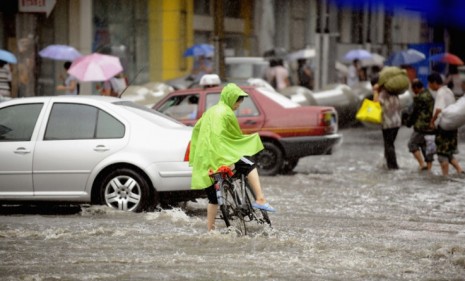Is climate change making us crazy?
A new report warns that droughts and floods can fuel severe mental-health problems like anxiety, depression, and even suicide

A free daily email with the biggest news stories of the day – and the best features from TheWeek.com
You are now subscribed
Your newsletter sign-up was successful
Scientists worldwide are forecasting severe drought, unprecedented flooding, and scorching heat waves as a result of climate change. One thing that's often overlooked in these discussions, however, is the effect that climate change may have on our mental health. But researchers in Australia have just published a report, A Climate of Suffering: The Real Cost of Living with Inaction on Climate Change, that gives us some new clues. Here, a brief guide to this research:
How could climate change affect our sanity?
First, natural disasters like hurricanes and floods have a profound impact on individual suffering. As a result of these disasters, as many as one in five people could suffer from anxiety, depression, suicide, domestic violence, or substance abuse, say the report's authors. Months after tropical cyclone Larry struck Australia in 2006, for example, more than one in 10 primary school children reported symptoms of post-traumatic stress disorder (PTSD). And in some rural Australian communities, the suicide rate has jumped by 8 percent since a massive drought took hold several years ago.
The Week
Escape your echo chamber. Get the facts behind the news, plus analysis from multiple perspectives.

Sign up for The Week's Free Newsletters
From our morning news briefing to a weekly Good News Newsletter, get the best of The Week delivered directly to your inbox.
From our morning news briefing to a weekly Good News Newsletter, get the best of The Week delivered directly to your inbox.
What other impacts are expected?
For years-long disasters, researchers have observed the long-term collapse of community solidarity. For instance, during and after events like the prolonged drought that has gripped Australia for more than a decade, there's "a breakdown of social cohesion caused by loss of work and associated stability," says Erik Jensen in the Sydney Morning Herald.
Who is most vulnerable to these problems?
Children are particularly susceptible to mental health issues like pre-disaster anxiety and post-traumatic stress disorder. And the long-term mental health effects of climate change are likely to be felt strongest in poorer countries and in rural areas within industrialized nations, the study finds, since these places have the least access to mental health services.
A free daily email with the biggest news stories of the day – and the best features from TheWeek.com
Aren't natural disasters like hurricanes and droughts normal?
Yes, but not with the intensity and frequency many areas of the world are now seeing. ''While cyclones, drought, bushfires [wildfires], and floods are all a normal part of Australian life, there is no doubt our climate is changing,'' say the report's authors. ''For instance, the intensity and frequency of bushfires is greater. This is a 'new normal', for which the past provides little guidance."
Sources: ABC.net.au, Khaleej Times, Sydney Morning Herald (2)
-
 Local elections 2026: where are they and who is expected to win?
Local elections 2026: where are they and who is expected to win?The Explainer Labour is braced for heavy losses and U-turn on postponing some council elections hasn’t helped the party’s prospects
-
 6 of the world’s most accessible destinations
6 of the world’s most accessible destinationsThe Week Recommends Experience all of Berlin, Singapore and Sydney
-
 How the FCC’s ‘equal time’ rule works
How the FCC’s ‘equal time’ rule worksIn the Spotlight The law is at the heart of the Colbert-CBS conflict